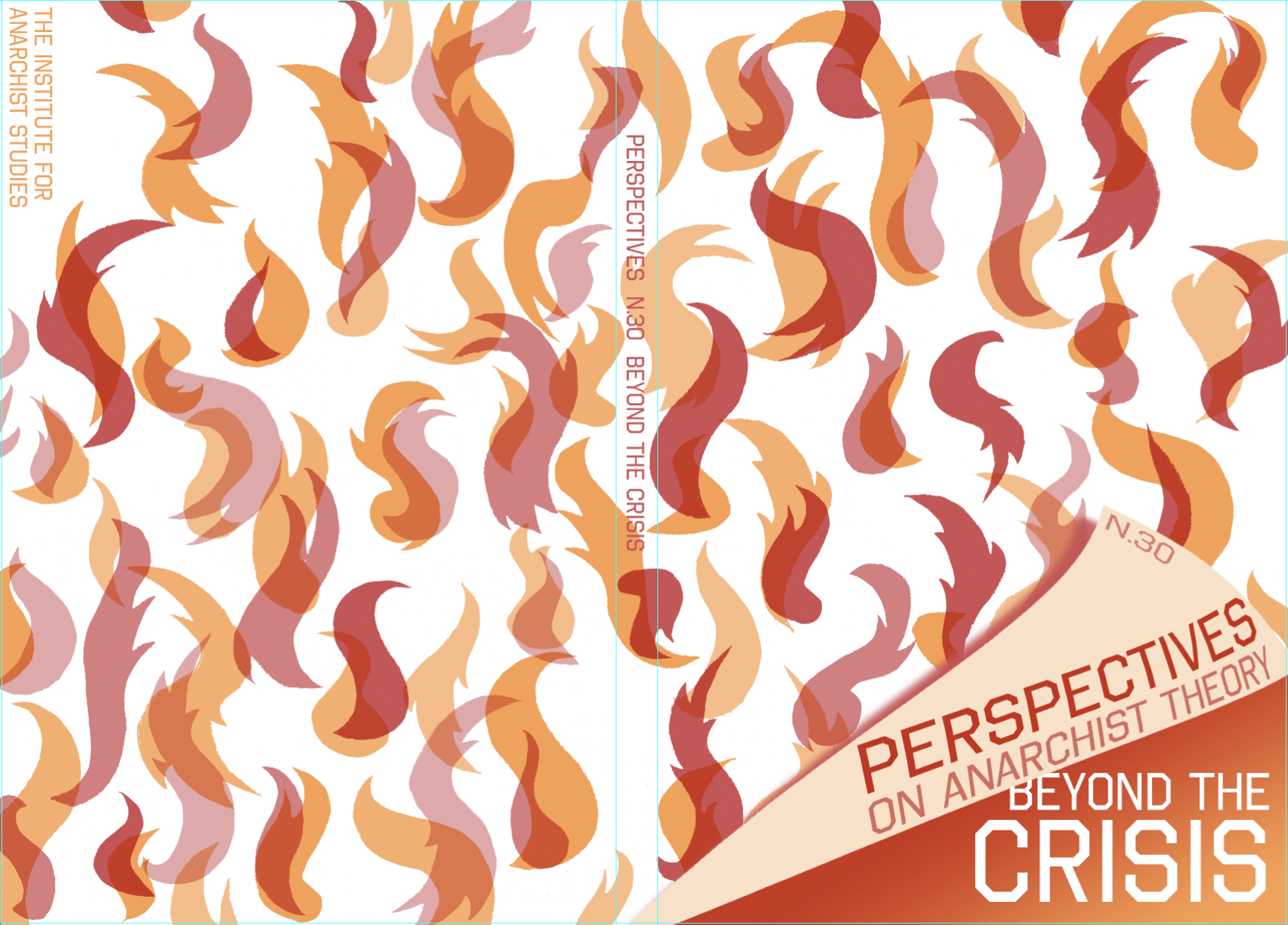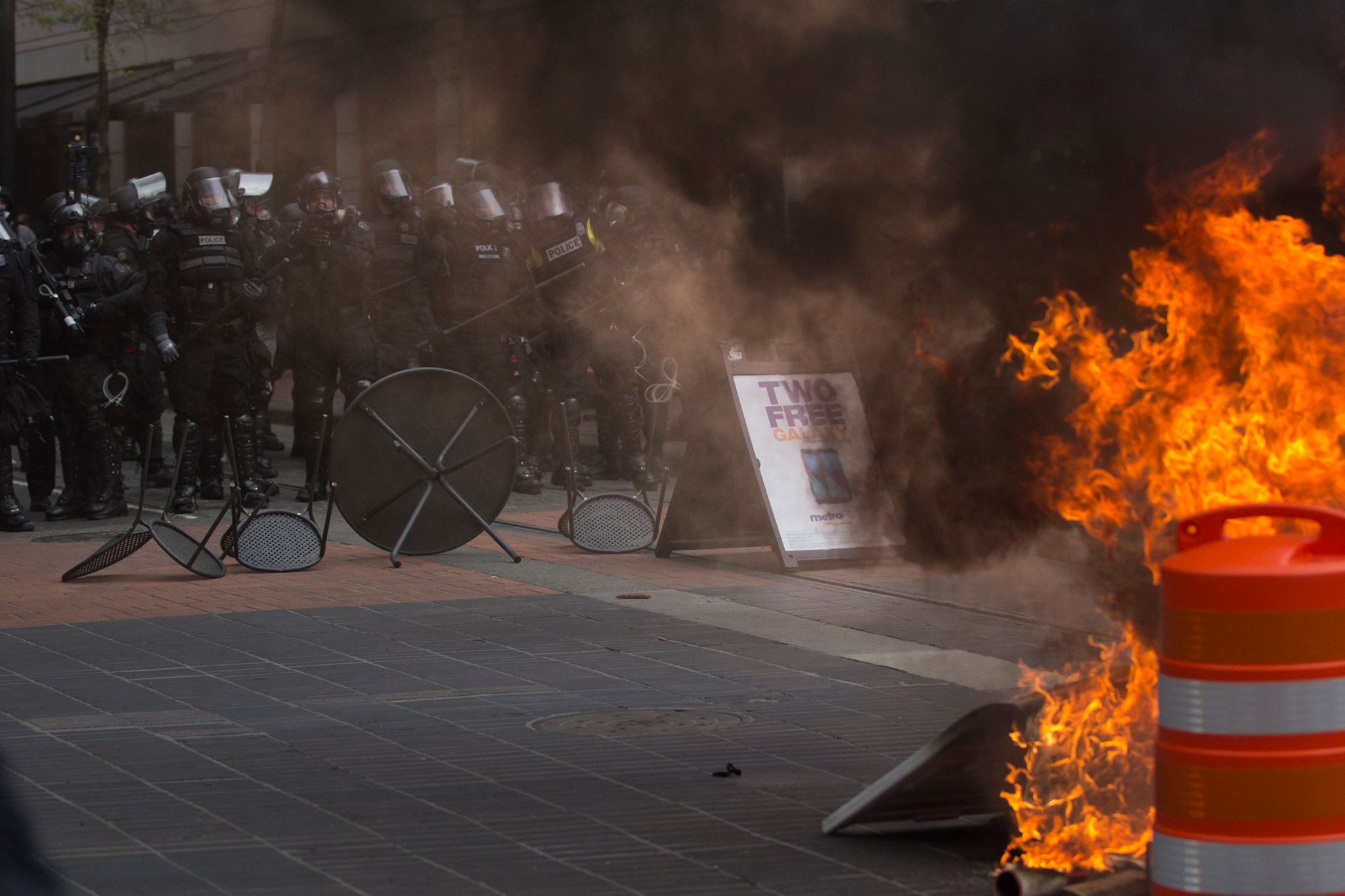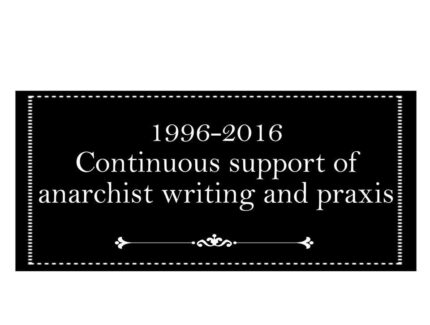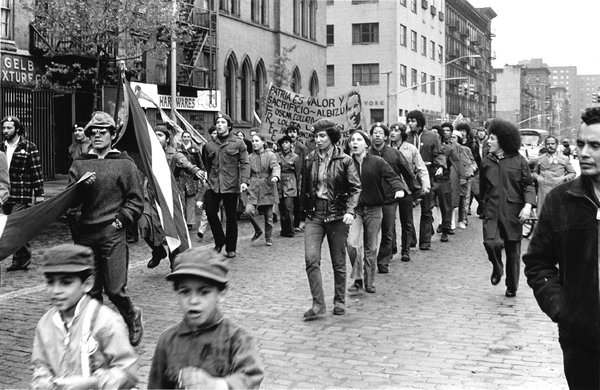 Here’s an interview with writer and activist Hillary Lazar on the connections between border politics and antifascism, applying intersectional frameworks to movement organizing. The discussion begins with a conversation about Lazar’s recent essay, “Connecting Our Struggles: Border Politics, Antifascism, and Lessons from the Trials of Ferrero, Sallito, and Graham,” published in Perspectives on Anarchist Theory (N30, “Beyond the Crisis” issue)
Here’s an interview with writer and activist Hillary Lazar on the connections between border politics and antifascism, applying intersectional frameworks to movement organizing. The discussion begins with a conversation about Lazar’s recent essay, “Connecting Our Struggles: Border Politics, Antifascism, and Lessons from the Trials of Ferrero, Sallito, and Graham,” published in Perspectives on Anarchist Theory (N30, “Beyond the Crisis” issue)
#Perspectives
Beyond the Crisis
The world is on fire. It has been, for quite some time. If you’ve done any organizing, you’ve felt it—that sense of racing about, extinguishing this flare up or that, spending precious energy and resources surviving the immediate emergency and hoping the future will somehow … Read more
An Anarchism of the Working-Class: A Review of Whither Anarchism?, by Kristian Williams (To the Point/AK Press, 2018), Reviewed by Miriam Pickens
I appreciate Kristian Williams’ pamphlet, both the thought put into it and the challenge it represents. I learned a lot from its history, and in particular gained insight into the behavior of anarchists I meet today. Williams traces some practices of contemporary US anarchism back to pacifism, looking at how contemporary anarchists unthinkingly accept much of that philosophy. In my view, that influence led to the movement prioritizing providing comfort to its participants, rather than organizing to change the circumstances that led to the discomfort they feel with society in the first place. This emphasis accepts the inevitability of capitalism and is therefore a strategy to live within its parameters. But I don’t think capitalism will allow us these spaces. Instead, it has to be overthrown and not allowed to come back.
Beyond Anti-fascism, But Not Without It, update
Thank you to those who have responded to the Beyond Anti-fascism, But Not Without It statement/call put out by the Perspectives on Anarchist Theory journal collective. Clearly there are many people pursuing this conversation in a variety of networks. Stay tuned for pieces coming from Perspectives on the Institute for Anarchist Studies website and in our 2018 Beyond the Crisis print issue.

― James Baldwin, The Fire Next Time
What Happened in Portland on May Day?
This May Day in Portland, Oregon about 1,500 people rallied and marched against capitalism, racism, and colonialism, including immigrant families, undocumented folks, people with disabilities, and working families with kids. It was International Workers Day, which commemorates the Haymarket affair, which took place in Chicago, … Read more
Critique and Renewal: The Institute for Anarchist Studies at Twenty
Chuck Morse
I played a pivotal role in the early history of the Institute for Anarchist Studies (IAS). I conceived of it, drafted all the founding documents, selected the initial Board of Directors, led early fundraising campaigns, and anchored it as a whole. Although I have had … Read more
CrimethInc. Reviews Perspectives on Anarchist Theory
Alanis, who does the podcast for CrimethInc. Ex-Workers’ Collective, with her partner in crime Clara, did a really thoughtful review of the current issue of Perspectives on Anarchist Theory (n.28) in their most recent broadcast. We excerpt it below, and provide links to the broadcast, the full transcript of the show, and to CrimethInc.’s website as well. Thanks comrades!
Perspectives on Anarchist Theory’s recent issue tackled the theme of “Justice” – quite a can of worms for the contemporary anarchist! The journal opens with a reflection on the theme written by the editorial collective, and quickly sets a thoughtful and inquisitive tone as it explores different dimensions of what justice might mean to anarchists in political, economic, ecological, and intra-movement or community contexts. It uses a series of rhetorical questions to prompt readers to examine our thoughts and values relating to justice without authority and the practical challenges posed by social oppression and reliance on state structures. While I sharply disagreed with their partial defense of certain principles of the US’s adversarial legal system, overall I found the introduction to be highly thought-provoking, and an excellent lens through which to read the forthcoming pieces.
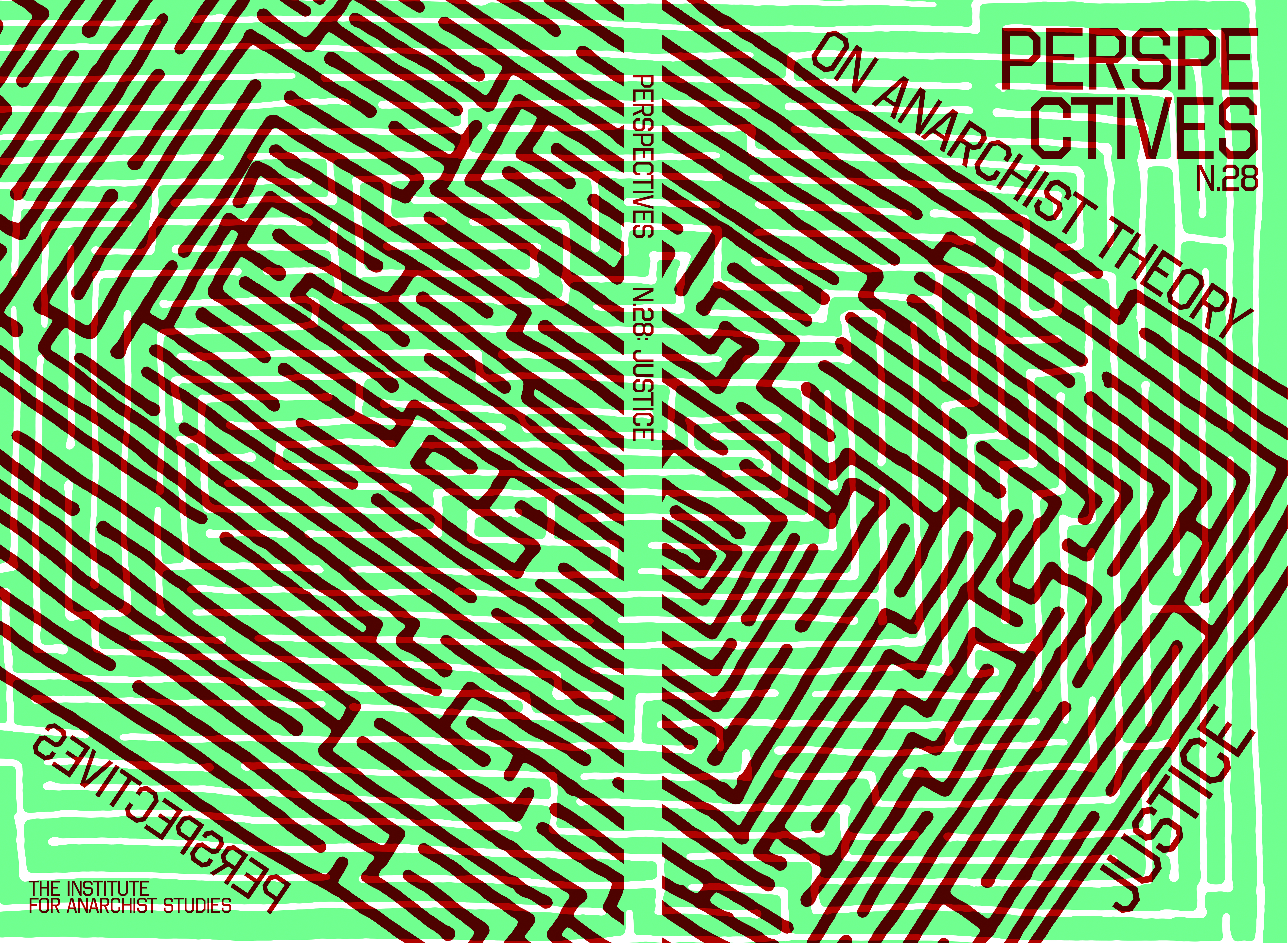
Field Notes From an Archipelago: A Review of Grabbing Back: Essays Against the Global Land Grab (AK Press, 2014), edited by Alexander Reid Ross, by Will Munger
A land and water grab is happening in the canyons and plateaus where I live in rural Utah. Several Canadian corporations backed by transnational investors are moving in to extract tar sands and oil shale on public lands. These outfits are the spear tips of a host of operators who are trying to strip mine the world’s dirtiest oil in the headwaters of the Colorado River, one of North America’s most endangered rivers.
In a region already hit by more than a decade of drought, the mining corporations are drilling deep into underground aquifers to pump water for their processing operations. At the ranch where I work, the springs in the canyon downstream from the initial mine are drying up. The ranching family is one of the first to be impacted by the mine, but there are bigger implications, as waste discharged from the mines will impact more than 30 million people who rely on the Colorado River for drinking water and irrigation.
And then there are the climate change consequences. According to industry backers, there are more potential fossil fuels in the Green River formation that stretches across Utah, Wyoming, and Colorado than the Alberta tar sands. If the infrastructure for these types of megaprojects is completed, there is an almost certainty of being locked in a path toward catastrophic climate change.
 With these stunning contradictions in mind, and with all legal options exhausted, local people and climate justice rebels took matters into their own hands in the summer of 2014 by establishing a resistance camp on the mine lease in order to halt mining operations. Amidst a summer of blockades, police repression, and the stresses of day-to-day rural resistance, it’s been a challenge to maintain a global perspective. It’s clear that our fight is being driven by capital and technical knowledge generated through the exploitation of the Alberta tar sands. It’s also clear that there are financiers intending to export these mining operations around the world using corporations deeply tied to the military industrial complex.
With these stunning contradictions in mind, and with all legal options exhausted, local people and climate justice rebels took matters into their own hands in the summer of 2014 by establishing a resistance camp on the mine lease in order to halt mining operations. Amidst a summer of blockades, police repression, and the stresses of day-to-day rural resistance, it’s been a challenge to maintain a global perspective. It’s clear that our fight is being driven by capital and technical knowledge generated through the exploitation of the Alberta tar sands. It’s also clear that there are financiers intending to export these mining operations around the world using corporations deeply tied to the military industrial complex.
But what are the strategic and tactical implications as to how we should carry out our struggle? What are our relationships and responsibilities to other communities fighting exploitative land grabs around the world? How can we use our collective power to fundamentally transform the political and economic structures that facilitate this ecocidal rush?
While thinking through these questions, I came across a copy of Grabbing Back: Essays Against the Global Land Grab. This compilation is billed as an “illustrative field guide to the way people power responds to the global land grab.” It ranges from pieces written by voices new to me, like Yangtze River Delta Earth First!, to long time writers and movement elders, like Grace Lee Boggs, Max Rameau, Vandana Shiva, Noam Chomsky, and Silvia Federici.
Class and Health: Community Acupuncture, by Paul Messersmith-Glavin
This piece originally appeared in the Care issue of Perspectives (Vol.13, N.2, Fall 2012). Perspectives is available from AK Press here. The Community Acupuncture movement began over ten years ago and now includes a couple hundred clinics across the US. Community Acupuncture seeks to address class … Read more
“In This World but Not Necessarily of It:” The Trajectories of Antiauthoritarian Movements. A Review of Chris Dixon’s Another Politics: Talking Across Today's Transformative Movements, by Craig Fortier
This review of Chris Dixon’s Another Politics appears in the current issue of Perspectives, available here from AK Press.
It was one of those meetings where the room we booked was far too large for the number of people who actually showed up. It was the type of meeting where you rearrange the chairs to form a small circle in a corner so that the disappointing turnout feels less deflating. Myself and three other members of No One Is Illegal-Toronto huddled to discuss two fledgling campaigns we were involved in. The first was the awkwardly named “Don’t Ask, Don’t Tell”1 campaign that hoped to mobilize toward a municipal policy that would bar city staff from asking for immigration identification or reporting someone’s immigration status to the authorities. The second was our anti-deportation direct action casework, which evolved from a model developed by the Ontario Coalition Against Poverty to fight welfare bureaucracy. We had faced a soul-sucking defeat earlier that year following the deportation of beloved community activist Queen Nzinga, who was arrested by Toronto police at a bake sale during International Women’s Day. It was mid-summer 2005, and the day-to-day grind of organizing had taken its toll on our collective energies. Without the bulk of the group’s members, we decided to not have any discussions about nuts and bolts of organizing upcoming events or actions and instead have a more general conversation about the direction of our collective. 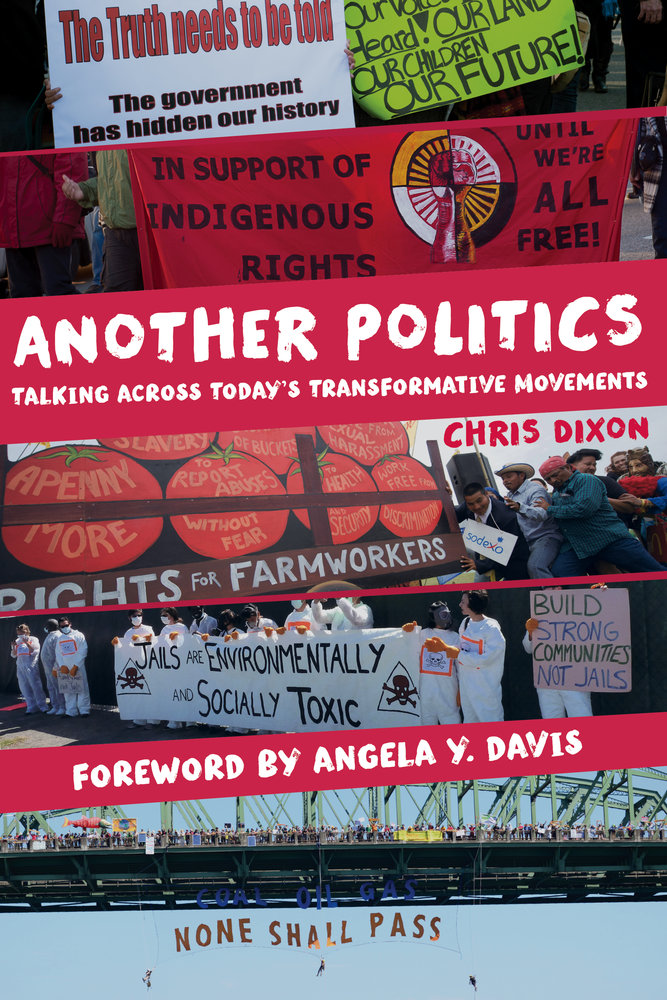 It was in that discussion that I first became aware of what Chris Dixon (2014) explains, in his book Another Politics: Talking Across Today’s Transformative Movements, is a fundamental principle underlying the antiauthoritarian current in today’s social movements: we were trying to figure out how to work “in the space between our transformative aspirations and actually existing social realties” (8). We saw in those campaigns two very different yet interconnected desires – the prefigurative aspirations of a world where people had the freedom to move and the freedom to stay, and the struggle to dismantle the state, capitalism, and the white supremacist settler colonial logics that undergird Canada’s immigration laws.
It was in that discussion that I first became aware of what Chris Dixon (2014) explains, in his book Another Politics: Talking Across Today’s Transformative Movements, is a fundamental principle underlying the antiauthoritarian current in today’s social movements: we were trying to figure out how to work “in the space between our transformative aspirations and actually existing social realties” (8). We saw in those campaigns two very different yet interconnected desires – the prefigurative aspirations of a world where people had the freedom to move and the freedom to stay, and the struggle to dismantle the state, capitalism, and the white supremacist settler colonial logics that undergird Canada’s immigration laws.


